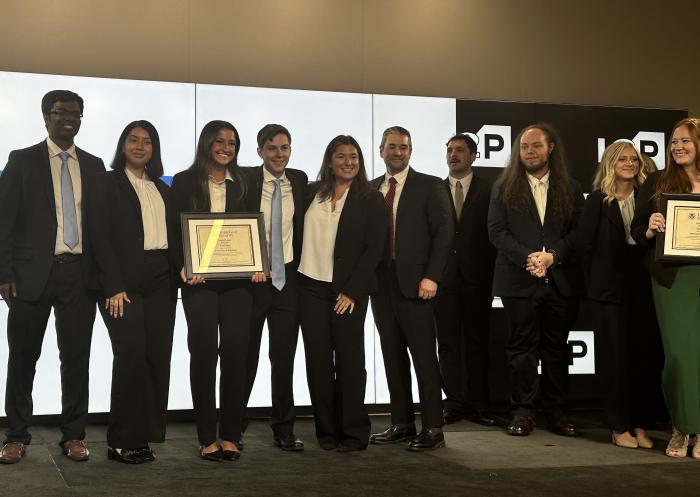UMD Students Win National Competition Designed to Reduce Violence
A team of students in UMD’s Global Terrorism Studies minor program recently won the national Invent2Prevent competition, an experiential learning program encouraging high school and college students to design and implement creative solutions to prevent targeted violence, hate, or terrorism in their communities. The UMD team won a first-place $10,000 prize.
The event was sponsored by the Department of Homeland Security.
The UMD team is mentored by researchers Elena Akers and Megan Rutter of the National Consortium for the Study of Terrorism and Responses to Terrorism (START), which houses the Global Terrorism Studies Minor.
“In the serious and often grim field of terrorism and targeted violence, the students developed and implemented a prevention-focused project that is engaging and fun, while still relying on evidence-based research, which particularly impressed the judges,” Akers said. “The Global Terrorism Studies Minor program provided a theoretical foundation that the students then built on with their own creative ideas, following the issues and tactics they felt were most important. We're very proud of the work they put in throughout the semester and looking forward to seeing how they continue the project.”
The winning students who presented at the event are: Zoe Cross, Theodore Hirsch, Ashton Labarta, Kevin John and Stefanie Mena-Gonzalez. The team also included Aylah Dhruv, Katherine Gonzalez and Makenna Osterfield.
Their project, infOasis, focuses on equipping teens “with the skills and knowledge necessary to navigate the complex landscape of media, fostering a generation of discerning consumers and creators who can engage with digital content thoughtfully, critically, and responsibly.”
The team built toolkits related to image and media alteration and propaganda and false media, as well as an arcade of mini-games to help users develop and test media literacy skills. Members of the team promoted their work primarily via TikTok and Instagram.
In measuring the effectiveness of the toolkits and mini games, the team found that there was a 132% increase (8.33% to 41.88%) in users who could correctly identify AI-generated images after utilizing the infOasis content. They also found that users' self-perception of media literacy proficiency increased from 5.5 to 8.5 on a 10-point scale after using the toolkits.
The content reached more than 17,000 accounts on Instagram, and had more than 60,000 overall social media impressions.
“Our team chose media literacy education among college kids, because we found that college kids spend more time online than any other age group. Despite this, only 55% report not even being moderately confident in their ability to detect false information online, and only 20% of students aged 16-24 are digitally literate,” Cross said.
Cross explained that because the team members are all college students, they understand the vast amount of information that students are exposed to when first entering college, as well as how college students prefer to learn in their free time. Thus, they decided on an online toolkit. The toolkit features fun mini games and interactive modules, and the website enhances media literacy in a way that Cross explained “doesn’t feel forced or like school.”
“By gamifying media literacy education, we have appealed to our target audience in an incredibly successful way,” Cross said. “Winning feels amazing, after a semester of such hard work, research, and content creation. We are ecstatic that others also feel our content is meaningful and impactful and trust that we can continue to help educate individuals with our project. Our team is so passionate about this topic and can’t wait to help others feel the same way through our content.”
Photo provided by START
Published on Fri, Jun 28, 2024 - 12:41PM




